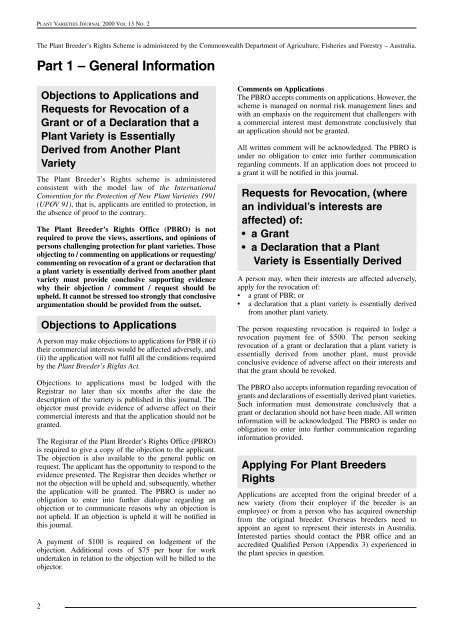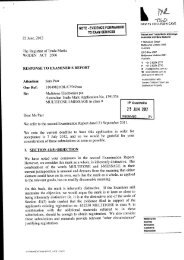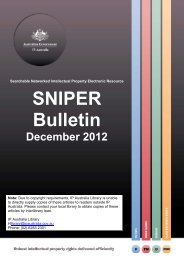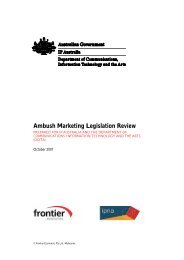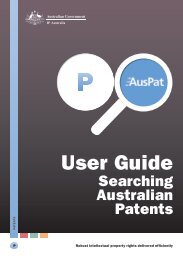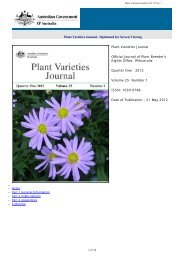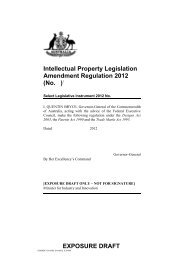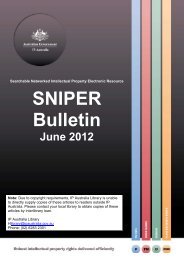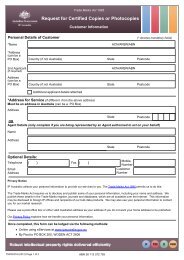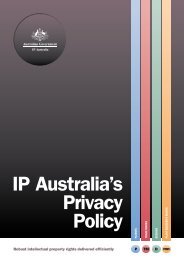52. Volume 13- Number 2 - IP Australia
52. Volume 13- Number 2 - IP Australia
52. Volume 13- Number 2 - IP Australia
You also want an ePaper? Increase the reach of your titles
YUMPU automatically turns print PDFs into web optimized ePapers that Google loves.
PLANT VARIETIES JOURNAL 2000 VOL <strong>13</strong> NO. 2<br />
The Plant Breeder’s Rights Scheme is administered by the Commonwealth Department of Agriculture, Fisheries and Forestry – <strong>Australia</strong>.<br />
Part 1 – General Information<br />
Objections to Applications and<br />
Requests for Revocation of a<br />
Grant or of a Declaration that a<br />
Plant Variety is Essentially<br />
Derived from Another Plant<br />
Variety<br />
The Plant Breeder’s Rights scheme is administered<br />
consistent with the model law of the International<br />
Convention for the Protection of New Plant Varieties 1991<br />
(UPOV 91), that is, applicants are entitled to protection, in<br />
the absence of proof to the contrary.<br />
The Plant Breeder’s Rights Office (PBRO) is not<br />
required to prove the views, assertions, and opinions of<br />
persons challenging protection for plant varieties. Those<br />
objecting to / commenting on applications or requesting/<br />
commenting on revocation of a grant or declaration that<br />
a plant variety is essentially derived from another plant<br />
variety must provide conclusive supporting evidence<br />
why their objection / comment / request should be<br />
upheld. It cannot be stressed too strongly that conclusive<br />
argumentation should be provided from the outset.<br />
Objections to Applications<br />
A person may make objections to applications for PBR if (i)<br />
their commercial interests would be affected adversely, and<br />
(ii) the application will not fulfil all the conditions required<br />
by the Plant Breeder’s Rights Act.<br />
Objections to applications must be lodged with the<br />
Registrar no later than six months after the date the<br />
description of the variety is published in this journal. The<br />
objector must provide evidence of adverse affect on their<br />
commercial interests and that the application should not be<br />
granted.<br />
The Registrar of the Plant Breeder’s Rights Office (PBRO)<br />
is required to give a copy of the objection to the applicant.<br />
The objection is also available to the general public on<br />
request. The applicant has the opportunity to respond to the<br />
evidence presented. The Registrar then decides whether or<br />
not the objection will be upheld and, subsequently, whether<br />
the application will be granted. The PBRO is under no<br />
obligation to enter into further dialogue regarding an<br />
objection or to communicate reasons why an objection is<br />
not upheld. If an objection is upheld it will be notified in<br />
this journal.<br />
A payment of $100 is required on lodgement of the<br />
objection. Additional costs of $75 per hour for work<br />
undertaken in relation to the objection will be billed to the<br />
objector.<br />
Comments on Applications<br />
The PBRO accepts comments on applications. However, the<br />
scheme is managed on normal risk management lines and<br />
with an emphasis on the requirement that challengers with<br />
a commercial interest must demonstrate conclusively that<br />
an application should not be granted.<br />
All written comment will be acknowledged. The PBRO is<br />
under no obligation to enter into further communication<br />
regarding comments. If an application does not proceed to<br />
a grant it will be notified in this journal.<br />
Requests for Revocation, (where<br />
an individual’s interests are<br />
affected) of:<br />
• a Grant<br />
• a Declaration that a Plant<br />
Variety is Essentially Derived<br />
A person may, when their interests are affected adversely,<br />
apply for the revocation of:<br />
• a grant of PBR; or<br />
• a declaration that a plant variety is essentially derived<br />
from another plant variety.<br />
The person requesting revocation is required to lodge a<br />
revocation payment fee of $500. The person seeking<br />
revocation of a grant or declaration that a plant variety is<br />
essentially derived from another plant, must provide<br />
conclusive evidence of adverse affect on their interests and<br />
that the grant should be revoked.<br />
The PBRO also accepts information regarding revocation of<br />
grants and declarations of essentially derived plant varieties.<br />
Such information must demonstrate conclusively that a<br />
grant or declaration should not have been made. All written<br />
information will be acknowledged. The PBRO is under no<br />
obligation to enter into further communication regarding<br />
information provided.<br />
Applying For Plant Breeders<br />
Rights<br />
Applications are accepted from the original breeder of a<br />
new variety (from their employer if the breeder is an<br />
employee) or from a person who has acquired ownership<br />
from the original breeder. Overseas breeders need to<br />
appoint an agent to represent their interests in <strong>Australia</strong>.<br />
Interested parties should contact the PBR office and an<br />
accredited Qualified Person (Appendix 3) experienced in<br />
the plant species in question.<br />
2


